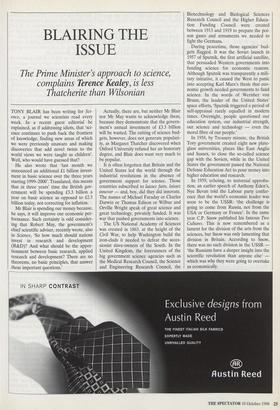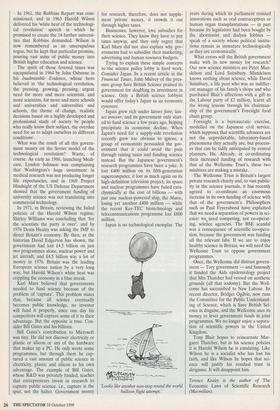BLAIRING THE ISSUE
TONY BLAIR has been writing for Sci- ence, a journal we scientists read every week. In a recent guest editorial he explained, as if addressing idiots, that 'sci- ence continues to push back the frontiers of knowledge, finding new areas of which we were previously unaware and making discoveries that add novel twists to the world views we were taught as children'. Well, who would have guessed that?
He also wrote that 'last month we announced an additional £1 billion invest- ment in basic science over the three years starting 1999-2000'. Translated, this means that in three years' time the British gov- ernment will be spending £3.3 billion a year on basic science as opposed to £2.3 billion today, not correcting for inflation.
Mr Blair is spending our money because, he says, it will improve our economic per- formance. Such certainty is odd consider- ing that Robert May, the government's chief scientific adviser, recently wrote, also in Science, 'So how much should nations invest in research and development (R&D)? And what should be the appor- tionment between basic research, applied research and development? There are no theorems, no basic principles, that answer these important questions.' Actually, there are, but neither Mr Blair nor Mr May wants to acknowledge them, because they demonstrate that the govern- ment's annual investment of £3.3 billion will be wasted. The cutting of science bud- gets, however, does not generate populari- ty, as Margaret Thatcher discovered when Oxford University refused her an honorary degree, and Blair does want very much to be popular.
It is often forgotten that Britain and the United States led the world through the industrial revolutions in the absence of government support for science. Those countries subscribed to laissez faire, laissez innover — and, boy, did they did innovate. The names of Michael Faraday or Charles Darwin or Thomas Edison or Wilbur and Orville Wright speak of great science and great technology, privately funded. It was war that pushed governments into science.
The US National Academy of Sciences was created in 1863, at the height of the Civil War, to help Washington build the iron-clads it needed to defeat the seces- sionist slave-owners of the South. In the United Kingdom, the forerunners of the big government science agencies such as the Medical Research Council, the Science and Engineering Research Council, the Biotechnology and Biological Sciences Research Council and the Higher Educa- tion Funding Council were created between 1913 and 1919 to prepare the poi- son gases and armaments we needed to fight the Germans.
During peacetime, those agencies' bud- gets flagged. It was the Soviet launch in 1957 of Sputnik, the first artificial satellite, that persuaded Western governments into funding science for economic reasons. Although Sputnik was transparently a mili- tary initiative, it caused the West to panic into accepting Karl Marx's thesis that eco- nomic growth needed governments to fund science. In the words of Wernher von Braun, the leader of the United States' space efforts, 'Sputnik triggered a period of self-appraisal rarely equalled in modern times. Overnight, people questioned our education system, our industrial strength, our science and technology — even the moral fibre of our people.'
In 1958, by Treasury minute, the British Tory government created eight new plate- glass universities, places like East Anglia and Sussex, to close the so-called science gap with the Soviets, while in the United States the government passed the National Defense Education Act to pour money into higher education and research.
In 1959, echoing, to universal approba- tion, an earlier speech of Anthony Eden's, Nye Bevan told the Labour party confer- ence that the world's economic leader was soon to be the USSR: 'the challenge is going to come from Russia, not from the USA or Germany or France'. In the same year C.P. Snow published his famous Two Cultures. This is now remembered as a lament for the division of the arts from the sciences, but Snow was only lamenting that division in Britain. According to Snow, there was no such division in the USSR — 'the Russians have a deeper insight into the scientific revolution than anyone else' — which was why they were going to overtake us economically. In 1961, the Robbins Report was com- missioned, and in 1963 Harold Wilson delivered his 'white heat of the technologi- cal revolution' speech in which he promised to create the 14 further universi- ties that Robbins demanded. Wilson is now remembered as an unscrupulous rogue, but he kept that particular promise, pouring vast sums of public money into British higher education and science.
The spirit of those fevered times was encapsulated in 1964 by John Osborne in his Inadmissible Evidence, whose hero believed in 'the technological revolution, the pressing, growing, pressing, urgent need for more and more scientists, and more scientists, for more and more schools and universities and universities and schools, the theme of change, realistic decisions based on a highly developed and professional study of society by people who really know their subject, the overdue need for us to adapt ourselves to different conditions'.
What was the result of all this govern- ment money on the Soviet model of the technological revolution? Waste, of course. As early as 1966, launching Medi- care, Lyndon Johnson was complaining that Washington's huge investment in medical research was not producing longer life expectancies, and in 1969 Project Hindsight of the US Defense Department showed that the government funding of university science was not translating into commercial technology.
In 1971, in Britain, reviewing the failed policies of the Harold Wilson regime, Shirley Williams was concluding that 'for the scientists the party is over', and by 1976 Denis Healey was asking the IMF to direct Britain's economy. By then, as the historian David Edgerton has shown, the government had lost £4.5 billion on just two programmes alone, nuclear power and jet aircraft, and £4.5 billion was a lot of money in 1976. Britain was the leading European science nation by a very long way, but Harold Wilson's white heat was crippling the economy in a blue streak.
Karl Marx believed that governments needed to fund science because of the problem of 'capture'. This problem states that, because all science eventually becomes public knowledge, no investor will fund it properly, since one day his competitors will capture some of it to their advantage. But the opposite is true. Con- sider Bill Gates and his billions.
Bill Gates's contribution to Microsoft was tiny. He did not discover electricity or plastic or silicon or any of the hardware that makes up a PC. He only wrote some programmes, but through them he cap- tured a vast amount of public science in electricity, plastic and silicon to his own advantage. The example of Bill Gates, whose R&D was privately funded, teaches that entrepreneurs invest in research to capture public science. i.e., capture is the spur, not the halter. Government money for research, therefore, does not supple- ment private money, it crowds it out through higher taxes.
Businesses, however, love subsidies for their science. They know they have to pay taxes anyway, and they only regret that Karl Marx did not also explain why gov- ernments had to subsidise their marketing, advertising and human resource budgets.
Trying to explain these simple concepts to the science policy lobby is hard work. Consider Japan. In a recent article in the Financial Times, John Mulvey of the pres- sure group Save British Science praised its government for doubling its investment in science. Only a British science lobbyist would offer today's Japan as an economic cynosure.
Japan grew rich under laissez faire, lais- sez innover, and its government only start- ed to fund science a few years ago, helping precipitate its economic decline. When Japan's need for a supply-side revolution recently grew too obvious to ignore, a group of economists persuaded the gov- ernment that it could avoid the pain through raising taxes and funding science instead. But the Japanese government's research programmes have been a joke. It lost £400 million on its fifth-generation supercomputer, it lost as much again on its high-definition television project, its space and nuclear programmes have failed cata- clysmically at the cost of billions — with just one nuclear-powered ship, the Mutsu, losing yet another £400 million — while the recent Key-TEC biotechnology and telecommunications programme lost £800 million.
Japan is no technological exemplar. The 'Looks like another non-stop round the world balloon flight attempt.' years during which its parliament resisted innovations such as oral contraceptives or human organ transplantations — in part because its legislators had been bought by the abortionist and dialysis lobbies — speak of a society whose political institu- tions remain as immature technologically as they are economically.
What errors will the British government make with its new money for research? Our new science ministers are Peter Man- delson and Lord Sainsbury. Mandelson knows nothing about science, while David Sainsbury, a life peer who was an indiffer- ent manager of his family's shops and who purchased Blair's affections with a gift to the Labour party of £2 million, learnt all the wrong lessons through his chairman- ship of the government's Foresight food chain group.
Foresight is a bureaucratic exercise, modelled on the Japanese civil service, which supposes that scientific advances are not the unpredictable, laboratory-based phenomena they actually are, but process- es that can be tidily anticipated by central planners. Ha. Already, in co-ordinating their increased funding of research with that of the Wellcome Trust's, these two ministers are making a mistake.
The Wellcome Trust is Britain's largest private research charity and, to vast public- ity in the science journals, it has recently agreed to co-ordinate an enormous increase in its own funding of science with that of the government's. Philosophers such as Paul Feyerabend have explained that we need a separation of powers in sci- ence: we need competing, not co-operat- ing, science agencies. The BSE scandal was a consequence of scientific co-opera- tion, because the government was funding all the relevant labs. If we are to enjoy healthy science in Britain, we will need the Wellcome Trust to oppose government programmes.
Once, the Wellcome did distrust govern- ment — Tory government — and famously it funded the Aids epidemiology project that Mrs Thatcher had vetoed on aesthetic grounds (all that sodomy). But the Well- come has succumbed to New Labour. Its recent director, Bridget Ogilvie, now runs the Committee for the Public Understand- ing of Science, which is Save British Sci- ence in disguise, and the Wellcome uses its money to lever government funds in joint programmes. We no longer enjoy a separa- tion of scientific powers in the United Kingdom.
Tony Blair hopes to reincarnate Mar- garet Thatcher, but in his science policies it is Harold Wilson he is emulating. Like Wilson he is a socialist who has lost his faith, and like Wilson he hopes that sci- ence will justify his residual trust in dirigisme. It will disappoint him.
Terence Kealey is the author of The Economic Laws of Scientific Research (Macmillan).











































































 Previous page
Previous page